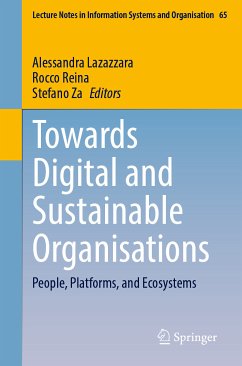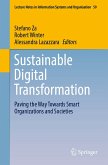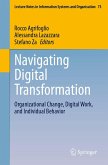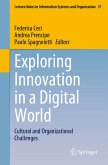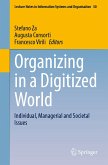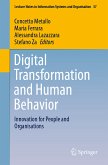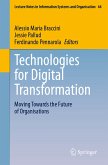Towards Digital and Sustainable Organisations (eBook, PDF)
People, Platforms, and Ecosystems
Redaktion: Lazazzara, Alessandra; Za, Stefano; Reina, Rocco


Alle Infos zum eBook verschenken

Towards Digital and Sustainable Organisations (eBook, PDF)
People, Platforms, and Ecosystems
Redaktion: Lazazzara, Alessandra; Za, Stefano; Reina, Rocco
- Format: PDF
- Merkliste
- Auf die Merkliste
- Bewerten Bewerten
- Teilen
- Produkt teilen
- Produkterinnerung
- Produkterinnerung

Hier können Sie sich einloggen

Bitte loggen Sie sich zunächst in Ihr Kundenkonto ein oder registrieren Sie sich bei bücher.de, um das eBook-Abo tolino select nutzen zu können.
This book presents a collection of research papers that explore how ICT experts, managers, and policymakers can address sustainability issues in digital transformation (DT) by considering people practices, organizational processes, and platform design issues. Each chapter offers insights into how to create sustainable digital solutions that benefit both society and the environment.
The diversity of views presented makes this book particularly relevant for scholars, companies, and public sector organizations. The content is based on revised versions of selected papers (original double-blind…mehr
- Geräte: PC
- ohne Kopierschutz
- eBook Hilfe
- Größe: 12.52MB
![Sustainable Digital Transformation (eBook, PDF) Sustainable Digital Transformation (eBook, PDF)]() Sustainable Digital Transformation (eBook, PDF)129,95 €
Sustainable Digital Transformation (eBook, PDF)129,95 €![Navigating Digital Transformation (eBook, PDF) Navigating Digital Transformation (eBook, PDF)]() Navigating Digital Transformation (eBook, PDF)105,95 €
Navigating Digital Transformation (eBook, PDF)105,95 €![Exploring Innovation in a Digital World (eBook, PDF) Exploring Innovation in a Digital World (eBook, PDF)]() Exploring Innovation in a Digital World (eBook, PDF)113,95 €
Exploring Innovation in a Digital World (eBook, PDF)113,95 €![Digital (Eco) Systems and Societal Challenges (eBook, PDF) Digital (Eco) Systems and Societal Challenges (eBook, PDF)]() Digital (Eco) Systems and Societal Challenges (eBook, PDF)97,95 €
Digital (Eco) Systems and Societal Challenges (eBook, PDF)97,95 €![Organizing in a Digitized World (eBook, PDF) Organizing in a Digitized World (eBook, PDF)]() Organizing in a Digitized World (eBook, PDF)113,95 €
Organizing in a Digitized World (eBook, PDF)113,95 €![Digital Transformation and Human Behavior (eBook, PDF) Digital Transformation and Human Behavior (eBook, PDF)]() Digital Transformation and Human Behavior (eBook, PDF)73,95 €
Digital Transformation and Human Behavior (eBook, PDF)73,95 €![Technologies for Digital Transformation (eBook, PDF) Technologies for Digital Transformation (eBook, PDF)]() Technologies for Digital Transformation (eBook, PDF)129,95 €
Technologies for Digital Transformation (eBook, PDF)129,95 €-
-
-
The diversity of views presented makes this book particularly relevant for scholars, companies, and public sector organizations. The content is based on revised versions of selected papers (original double-blind peer-reviewed contributions) presented at the annual conference of the Italian Chapter of AIS, which took place in Catanzaro, Italy, in October 2022.
Dieser Download kann aus rechtlichen Gründen nur mit Rechnungsadresse in A, B, BG, CY, CZ, D, DK, EW, E, FIN, F, GR, HR, H, IRL, I, LT, L, LR, M, NL, PL, P, R, S, SLO, SK ausgeliefert werden.
- Produktdetails
- Verlag: Springer International Publishing
- Seitenzahl: 326
- Erscheinungstermin: 20. Mai 2024
- Englisch
- ISBN-13: 9783031528804
- Artikelnr.: 70728619
- Verlag: Springer International Publishing
- Seitenzahl: 326
- Erscheinungstermin: 20. Mai 2024
- Englisch
- ISBN-13: 9783031528804
- Artikelnr.: 70728619
- Herstellerkennzeichnung Die Herstellerinformationen sind derzeit nicht verfügbar.
